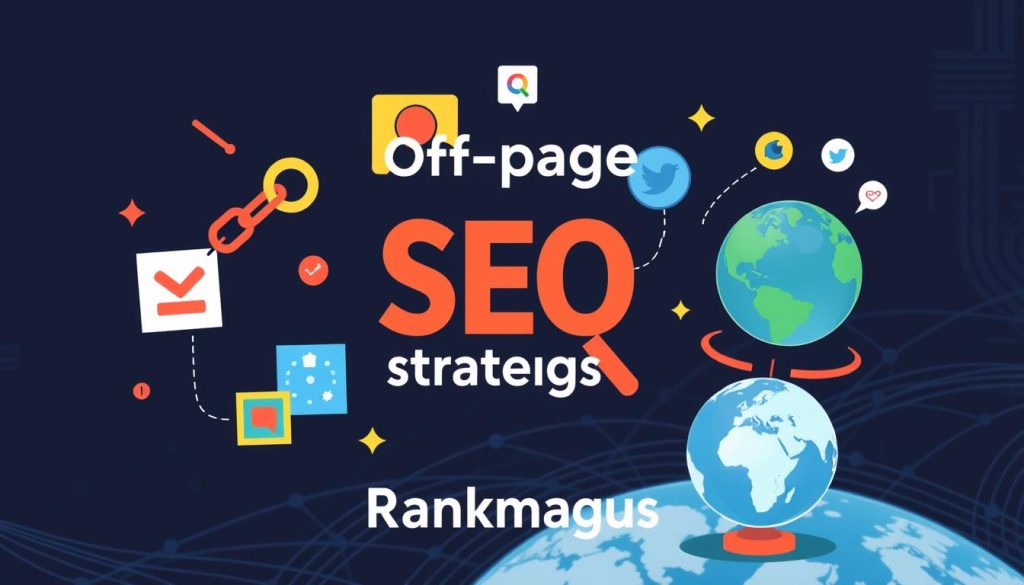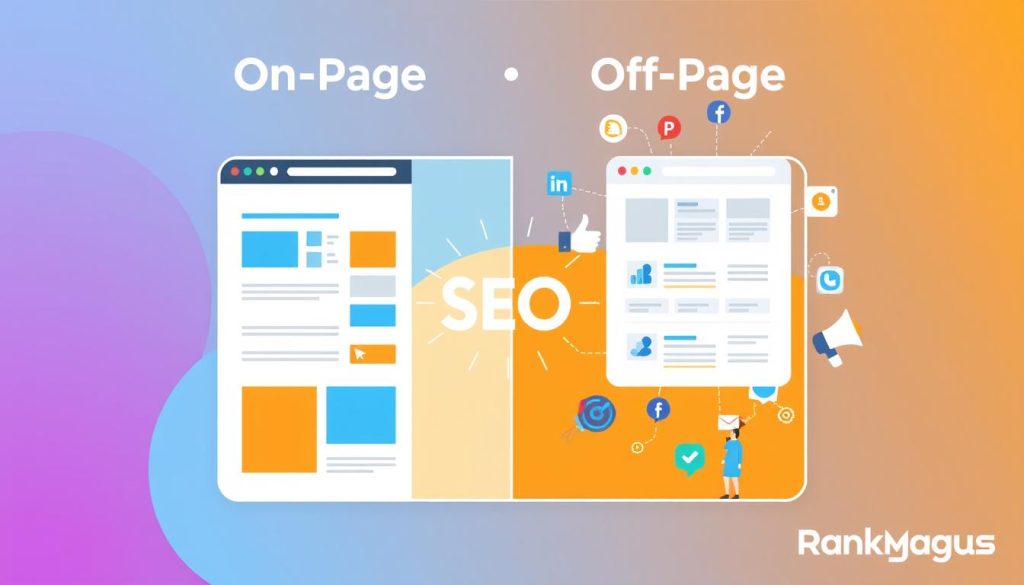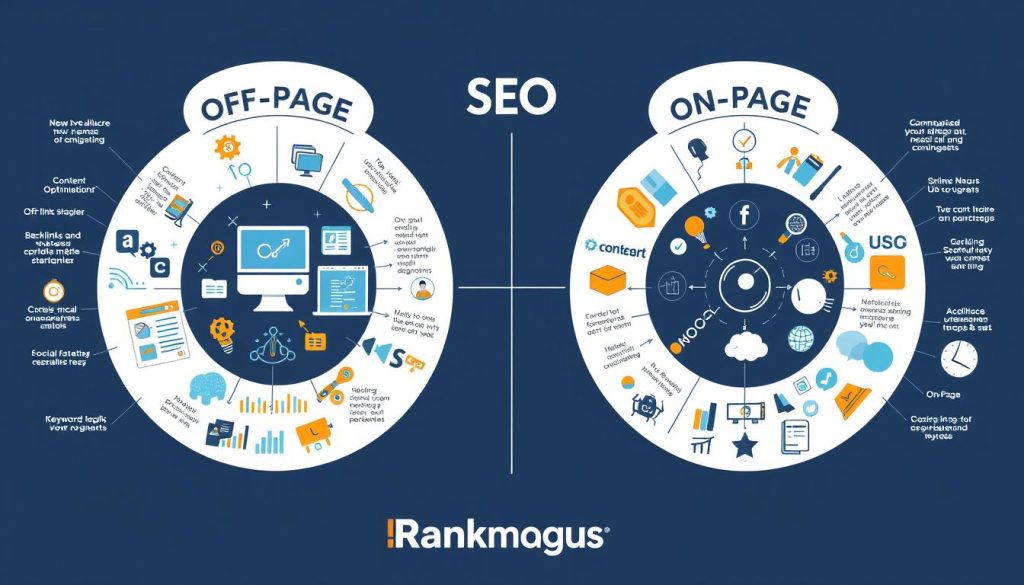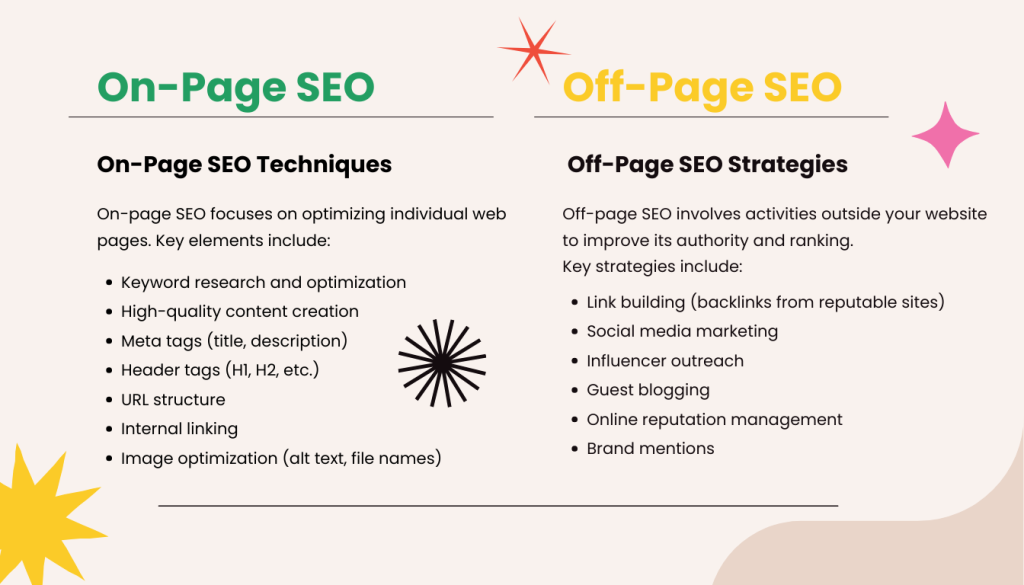Most online experiences start with a search engine. This makes search engine optimization (SEO) very important for digital marketing. You’ll learn about off-page SEO and on-page SEO. Knowing the difference is key for a good digital marketing plan.
Off-page SEO looks at things outside your site that affect its visibility. On-page SEO works on your site’s elements to boost search rankings.
Both off-page SEO and on-page SEO are important for your site’s online presence. Learning about them helps you make a strong SEO plan. This plan will bring more visitors to your site and improve your visibility online.
Table of Contents
Key Takeaways
- Understanding the difference between off page seo and on page seo is essential for a good digital marketing plan.
- Off page seo looks at external factors that affect your site’s visibility.
- On page seo focuses on improving your site’s elements for better search rankings.
- Both off page seo and on page seo are key for a strong online presence.
- A good SEO plan should use both off page seo and on page seo techniques.
- Using off page seo and on page seo can increase your site’s traffic and visibility.
Understanding the Foundations of SEO
Exploring search engine optimization (SEO) means learning key concepts. SEO helps your website show up more in search engines like Google. Good SEO strategies can boost your online presence, bringing more visitors to your site.
SEO techniques change over time. Search engines keep improving to give better results. This means SEO strategies also evolve. Knowing these strategies helps build a strong online marketing base.
What is Search Engine Optimization?
SEO makes your website more visible in search engine results. It uses techniques like keyword research and link building. These help your site rank higher and be seen as more credible.
The Evolution of SEO Practices
SEO has shifted to focus on quality and user experience. This change has led to more advanced strategies. Keeping up with new SEO techniques helps your site stay competitive online.
| SEO Technique | Description |
|---|---|
| Keyword Research | Identifying relevant keywords and phrases to optimize your content |
| On-Page Optimization | Optimizing your website’s structure and content to improve search engine rankings |
| Link Building | Building high-quality backlinks to increase your website’s authority and credibility |
Why Both Types of SEO Matter
Both on-page and off-page SEO are vital for success. A balanced approach can lead to better results. On-page SEO improves your site’s content and structure. Off-page SEO boosts your site’s authority through backlinks and social signals.
The Core Difference Between Off-Page SEO and On-Page SEO
Optimizing your website for search engines involves two main strategies: on-page and off-page optimization. On-page optimization means tweaking your website’s content, HTML, and structure to boost its search engine ranking. This is key because it helps search engines grasp your site’s content and its relevance to certain searches.
Off-page optimization, on the other hand, focuses on actions taken outside your site to improve rankings. This includes getting quality backlinks, increasing your site’s authority, and boosting your online presence through social media. The main difference is control: you control on-page elements, but off-page factors are outside your direct control.
Knowing the difference between on-page and off-page SEO is vital for a solid SEO plan. By working on both, you can make your site more visible, attract more visitors, and grow your online footprint. The debate between on-page and off-page SEO is ongoing, but both are critical for top search engine rankings. By using both strategies, you can outdo your competitors and reach your online goals.

- On-page SEO: Improving your site’s title tags, meta descriptions, and header tags to enhance its search engine ranking.
- Off-page SEO: Getting quality backlinks, engaging on social media, and boosting your site’s authority through reviews and testimonials.
By combining these strategies, you can craft a detailed SEO plan that yields real results. Whether you’re focusing on on-page or off-page optimization, the goal is to understand how they complement each other. This way, you can improve your site’s visibility and ranking on search engines.
Essential Elements of On-Page SEO
On-page SEO is key to getting your site noticed. It’s all about making your content better for search engines. This means your site will rank higher in search results.
Here are the main parts of on-page SEO:
- Content Optimization: Make your content valuable, relevant, and engaging for your audience.
- Technical SEO Factors: Make sure your site is fast, works well on mobile, and is secure (HTTPS).
- Meta Data Management: Use title tags, meta descriptions, and header tags to help search engines and users understand your content.
- URL Structure and Internal Linking: Create URLs that are easy to read and use internal links to help users and search engines navigate your site.
By focusing on these areas, you can boost your site’s visibility and attract more visitors. Remember, on-page SEO is vital for a strong online presence.
By using these strategies and keeping up with SEO trends, you can stay ahead. Whether you’re experienced or new to marketing, knowing on-page SEO is essential for success online.
| Element | Importance | Best Practices |
|---|---|---|
| Content Optimization | High | Use relevant keywords, create engaging content, optimize images |
| Technical SEO Factors | Medium | Ensure fast loading speed, use mobile-friendly design, secure connections (HTTPS) |
| Meta Data Management | Low | Use descriptive title tags, meta descriptions, and header tags |
| URL Structure and Internal Linking | Medium | Use SEO-friendly URLs, create a clear site structure, use internal links to improve user experience |
Key Components of Off-Page SEO
Link building is key in off-page SEO. Getting quality backlinks from trusted sites boosts your site’s authority and rankings. Off-page SEO helps increase your online presence and drives more traffic to your site. By making content shareable and engaging with your audience online, you boost your off-page SEO.
Some key components of off-page SEO include:
- Social media signals: A strong social media presence boosts your online visibility and drives more traffic.
- Brand mentions: Mentions of your brand on other sites increase your authority and reputation.
- Online reputation management: Managing your online reputation by responding to reviews and feedback improves your off-page SEO.
Off-page SEO importance is huge. It greatly affects your website’s ranking and visibility online. By using effective off-page SEO strategies, you can boost your website’s authority, drive more traffic, and increase your online presence.

| Off-Page SEO Component | Importance |
|---|---|
| Link Building | High |
| Social Media Signals | Medium |
| Brand Mentions | High |
| Online Reputation Management | Medium |
Understanding off-page SEO’s key components and using effective strategies can improve your website’s online presence. This drives more traffic to your site.
Measuring Success: Metrics for Both SEO Types
To see if your SEO is working, you need to track important metrics. When comparing seo ranking factors, knowing what to measure is key. Look at metrics like organic traffic, bounce rate, and time on site to understand your site’s performance.
For on-page SEO, tools help you watch things like page load speed. This is a big seo fundamentals point. A slow site hurts your rankings and user experience. By tracking these, you can make your SEO better and your site faster.
- Organic traffic: The number of visitors coming to your website from search engines.
- Bounce rate: The percentage of visitors who leave your website without taking any further action.
- Time on site: The amount of time visitors spend on your website.
- Domain authority: A measure of your website’s credibility and trustworthiness.
By tracking and analyzing these metrics often, you learn a lot about your SEO. This helps you make smart choices to boost your site’s performance.
| Metric | Description |
|---|---|
| Organic traffic | The number of visitors coming to your website from search engines. |
| Bounce rate | The percentage of visitors who leave your website without taking any further action. |
| Time on site | The amount of time visitors spend on your website. |
Implementation Strategies and Best Practices
For beginners in seo, knowing the difference between on-page and off-page is key. On-page optimization deals with your website’s content and meta tags. Off-page seo looks at external factors like link building and social media. Start by making an on-page seo checklist to optimize your site for search engines.
Off-page seo offers many benefits, like boosting your brand’s visibility and credibility. Building quality backlinks from trusted sources can help your site rank higher. To do this, create an off-page seo campaign. It should include content marketing, social media, and link building outreach.

- Optimizing meta tags and titles
- Creating high-quality, keyword-rich content
- Ensuring mobile-friendliness and page speed
By following these best practices and keeping up with seo trends, you can make your website more visible. This will help drive more traffic to your site.
Common Challenges and Solutions in Both SEO Types
Understanding the technical differences in SEO types is key to success. You might face challenges like optimizing for many keywords or dealing with duplicate content. On-page SEO also requires balancing SEO needs with user experience.
Off-page SEO can be tough too. Issues include getting high-quality backlinks and managing negative SEO attacks. You also need to keep up with search engine algorithm updates.
Some common solutions include creating high-quality, engaging content that your audience loves. Conducting thorough keyword research helps shape your strategy. Building a strong online presence through social media is also important.

- Optimize your website’s structure and content for multiple keywords
- Use canonical URLs to avoid duplicate content issues
- Focus on creating high-quality, engaging content that appeals to your target audience
- Build high-quality backlinks from authoritative sources
- Monitor your website’s performance and adjust your strategy as needed
By understanding and addressing the technical differences in SEO types, you can boost your website’s rankings. This will drive more traffic and help you reach your online marketing goals.
Budget Allocation: Balancing Your SEO Investment
Finding the right balance for your SEO budget is key. You must think about the costs for on-page optimization like content and technical work. Also, consider the time and money for off-page tasks like link building and marketing.
By knowing the seo techniques and seo strategies that fit your business, you can wisely spend your budget.
Start by looking at these factors that affect your budget:
- Business goals: What do you want to achieve, and how can SEO help?
- Industry: What are the SEO standards in your field, and how can you meet them?
- Current SEO standing: What’s your website’s ranking, and where do you need to improve?
With these factors in mind, you can create a detailed SEO plan. This plan should include both on-page and off-page seo strategies. You might need to invest in quality content, improve your website’s tech, and get good backlinks through off-page work. Always check and adjust your budget to get the most from your seo techniques.
The secret to good budget allocation is finding a balance that suits your business. By knowing your SEO needs and what’s most important, you can choose where to spend your resources. This way, you can get the best return on your investment.
| SEO Activity | Cost | Time Investment |
|---|---|---|
| On-page optimization | Varies | Ongoing |
| Off-page activities | Varies | Ongoing |
| Content creation | $500-$2,000 | 1-5 hours |
Future Trends in On-Page and Off-Page SEO
The world of SEO is always changing. Knowing about seo ranking factors comparison helps you keep up. On-page SEO is getting a boost from voice search and AI. With more voice commands, making your content easy to understand is key.
Mobile-first indexing is also important. This is because most people use their phones to browse the web. It’s vital for your site to work well on mobile devices.
Technological advancements are changing SEO. AI tools can now make your content better. This means your site will be more visible on search engines.
Off-page SEO is also evolving. Now, mentions of your brand without links matter a lot. This shows how seo ranking factors comparison is changing.
User-generated content, like reviews, is more important. It helps build trust and authority. Link building is now about quality, not just quantity. This highlights the technical differences in seo types.
SEO experts need to stay flexible. Keeping up with new trends is essential. By embracing new tech and understanding changes in seo ranking factors comparison, you can succeed in SEO.
Conclusion: Creating a Comprehensive SEO Strategy
Mastering both on-page SEO and off-page SEO is key to a strong online presence. This approach improves your search engine rankings. By using these SEO basics, you can make a strategy that covers all important factors.
SEO is a continuous effort. You need to keep checking, optimizing, and changing your strategy. Keep up with new trends, try new things, and adjust as search engines change. Making great content, improving your site’s tech, and getting more backlinks will keep you ahead online.
See SEO as a chance to always get better. By mixing on-page and off-page SEO strategies, you can reach new heights. This will help your brand succeed online for a long time.

